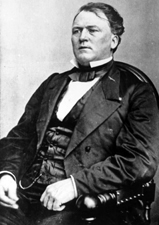Jesse D. Bright
Jesse David Bright (born December 18, 1812 in Norwich , Chenango County , New York , † May 20, 1875 in Baltimore , Maryland ) was an American politician ( Democratic Party ). He represented the state of Indiana in the US Senate , from which he was expelled in 1862 as the only senator of a northern state for sympathizing with the Confederation .
Early Years and Senate Advancement
Jesse Bright, whose ancestors immigrated from Germany , moved with his parents to Indiana in 1820, where the family settled in Madison and the boy attended public schools. He then studied law , was admitted to the bar in 1831 and began practicing law in Madison. In 1834 he was elected Judge in the Probate Court of Jefferson County ; from 1840 to 1841 he was US Marshal for the Indiana district.
Finally, Bright's political career began with membership in the Indiana Senate between 1841 and 1843. In 1842 he was elected lieutenant governor of his state; he held this office under Governor James Whitcomb from 1843 to 1845. In 1844 he won the election as US Senator for Indiana, whereupon he took his seat in Washington, DC from March 4 of the following year. Bright stood for re-election in 1850 and 1856, respectively, and chaired numerous committees in the Senate. He chaired the Committee on Enrolled Bills , the Committee on Public Buildings , the Committee on Revolutionary Claims and the Committee on Roads and Canals , among others . On December 5, 1854, he also took over the office of Senate President pro tempore for the first time , which he initially remained until June 9, 1856. Two days later he returned to this post, which he held again until January 6, 1857. He also acted as Acting Vice Precident of the United States , since US Vice President William R. King died shortly after his inauguration and the Senate President took the next rank pro tempore in the successor to the US President . A third short term of office followed on June 12 and 13, 1860.
Exclusion from Congress
In 1857 Bright received an offer from US President James Buchanan to become Secretary of State in his cabinet , but the Senator declined. He stayed in Congress , where he did not excel as a great speaker, but rather through his committee work. On February 5, 1862, Bright was expelled from the Senate by a majority of 29 Republican and ten Democratic Senators. The trigger was a letter he signed and addressed to Confederate President Jefferson Davis from the previous year, in which it was about possible arms sales to the breakaway southern states; Morton S. Wilkinson , a Senator from Minnesota , had presented the letter to the Chamber, which was found on a captured arms dealer during the First Battle of Bull Run . The expressed recognition of Jefferson Davis as President of the Confederation brought Bright's expulsion from Congress, for which, among other things, the Democratic Senator Stephen A. Douglas from Illinois voted. Jesse Bright was the 14th Senator to be affected by such a measure during the Civil War ; after him, no member of the Senate has been expelled to this day. In 1863 he ran again unsuccessfully for his own vacant seat.
After Union troops confiscated Bright's home in Port Fulton , he left Indiana and moved to Covington , Kentucky . There he continued his political career and sat in the State's House of Representatives from 1867 to 1871 . In the presidential election in 1868 he was a member of the Electoral College for the Democrats , which did not elect Horatio Seymour, victorious in Kentucky, as US President, but rather the Republican Ulysses S. Grant . From 1871 to 1875 Bright was then president of the Raymond City Coal Company . He spent his old age in Baltimore, where he died in May 1875 and was buried.
Web links
- Jesse D. Bright in the Biographical Directory of the United States Congress (English)
- Jesse D. Bright in the database of Find a Grave (English)
| personal data | |
|---|---|
| SURNAME | Bright, Jesse D. |
| ALTERNATIVE NAMES | Bright, Jesse David (full name) |
| BRIEF DESCRIPTION | American politician |
| DATE OF BIRTH | December 18, 1812 |
| PLACE OF BIRTH | Norwich , New York |
| DATE OF DEATH | May 20, 1875 |
| Place of death | Baltimore , Maryland |



